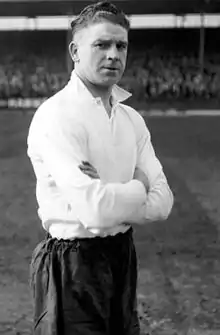George Camsell
George Henry Camsell (27 November 1902 – 7 March 1966)[2] was an English footballer who scored a club record 325 league goals in 419 games for Middlesbrough, and 18 goals in 9 appearances for England. His 59 goals in one season (1926–27) for Middlesbrough was a Football League record at the time, and has only ever be bettered within the English game by Dixie Dean of Everton in 1927–28.[3] His 9 hat-tricks that season remain a Football League record. He also holds the highest goals-to-games ratio for England of anyone who has played more than a single international.
 | |||
| Personal information | |||
|---|---|---|---|
| Full name | George Henry Camsell | ||
| Date of birth | 27 November 1902 | ||
| Place of birth | Framwellgate Moor, England | ||
| Date of death | 7 March 1966 (aged 63) | ||
| Place of death | England | ||
| Position(s) | Striker | ||
| Senior career* | |||
| Years | Team | Apps | (Gls) |
| Esh Winning | |||
| Tow Law Town | |||
| 1924–1925 | Durham City | 21 | (20) |
| 1925–1939 | Middlesbrough | 419[1] | (325) |
| National team | |||
| 1929–1936 | England | 9 | (18) |
| * Senior club appearances and goals counted for the domestic league only | |||
Career
Club career
Born in Framwellgate Moor, Durham City in 1902, Camsell worked as a miner and played for Durham City.[3] He caught the attention of Middlesbrough after scoring 21 goals in 20 games in a season and signed for Middlesbrough on 6 October 1925 for the sum of £500.[3] His début was against Nottingham Forest on 31 October 1925.[3] He scored three Boro goals in the 1925–26 season.[4]
The Middlesbrough club record of 59 League goals in 37 games and 63 goals in all competitions in one season is held by him; he accomplished this feat in the 1926–27 season, his first full season with Middlesbrough.[3] After he had initially struggled for game time and almost joined Barnsley,[3] he made his first appearance of the season on 18 September 1926 after Jimmy McClelland had suffered an injury.[4] Having failed to score on that day, Camsell would only fail to score on two more occasions in the following 25 matches, taking in a run of 12 successive matches in which he scored at least once.[4] He scored five on Christmas Day 1926 against Manchester City, and two more in the return fixture on 27 December.[4] In February 1927, Camsell broke the record for league goals in a season by a player, having overtaken Jimmy Cookson's haul of 44 (for Chesterfield in 1925–26).[4] 59 remains the second-highest number of league goals scored and the equal highest number in all competitions in one English league season, behind Dixie Dean's 60 league and 100 total a year later.[3] The nine hat-tricks he scored that season remains an English record for most in a League season.[5]
Camsell was Middlesbrough's top scorer in each of his first ten full seasons, and he bagged at least 30 in each of the first five as well as the tenth.[4] Between 1925 and 1939, Camsell scored 345 goals in 453 games for Middlesbrough, including 325 league goals, (the fifth-highest English total of all-time).[3] His goals included 24 hat-tricks for the club.[3] He played his last League game for Middlesbrough against Leicester City at Ayresome Park on 10 April 1939, in a 3–2 victory. Camsell scored the opening goal.[3] He continued to play for them into 1940 following the cessation of the 1939–40 Football League season during the Second World War, playing in wartime competitions.[4]
International career
Camsell also won nine caps for England, scoring 18 goals. This is the highest goals-to-games ratio of anyone who has played more than a single international.[3] His goals included a hat-trick in a 6–0 win against Wales on 20 November 1929 in the 1930 British Home Championship and four goals in a match against Belgium on 11 May 1929.[2] He scored in every match he played for England; his nine consecutive scoring appearances are second only to Steve Bloomer.[3]
Coaching career
During the Second World War, Camsell worked in local factories.[3] After the war, he worked for Middlesbrough's backroom staff, firstly as a scout, where he discovered a young Brian Clough.[3] He then became a coach and eventually the club's assistant secretary.[3]
Death and legacy
Camsell retired in 1963 and died in 1966, aged 63, shortly before that year's World Cup.[3] A suite at Middlesbrough's Riverside Stadium is named after him and in 2015, calls began for a statue of Camsell to be placed outside the stadium, joining those of George Hardwick and Wilf Mannion.[3] A club spokesman said that such an honour could not be ruled out, adding: "As a club we honour and respect our former heroes and George Camsell is certainly one of those."[3]
References
- Joyce, Michael (2004). Football League Players' Records 1888–1939. Nottingham: Soccerdata. p. 47. ISBN 1-899468-67-6.
- "England players: George Camsell". englandfootballonline. 30 January 2018. Retrieved 11 July 2018.
- Andy Bell; Duncan Leatherdale (19 September 2015). "George Camsell: The best England striker you never heard of". BBC. Retrieved 19 September 2015.
- Burnton, Simon (21 December 2017). "Golden Goals: when George Camsell scored five on Christmas Day 1926". The Guardian. Guardian Media Group. Retrieved 1 March 2018.
- Ballard, John; Suff, Paul (1999). World Soccer The Dictionary of Football. Boxtree Ltd. p. 111. ISBN 0-7522-2434-4.